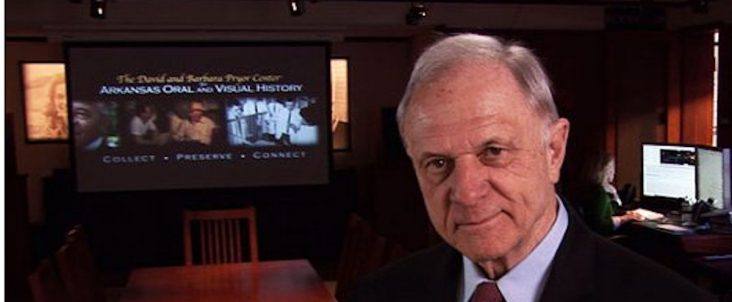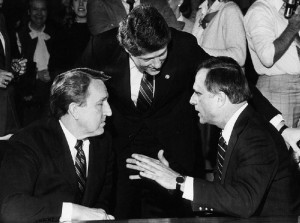Sen. Pryor recalls memories of Dale Bumpers, other Arkansas politicians
by January 6, 2016 9:34 pm 887 views

Former U.S. Sen. David Pryor, D-Ark.
U.S. Sen. David Pryor enjoyed such a close relationship with the late Sen. Dale Bumpers that the two senators could finish each other’s jokes as they traveled across the state on treks they called “Antiques Roadshows,” Pryor said during a question and answer session at the Ron Robinson Theater Wednesday.
Pryor said some states’ senators were barely on speaking terms, specifically mentioning New Jersey Sens. Bill Bradley and Frank Lautenberg.
“Dale and I never had that. We had a relationship and a camaraderie and a friendship, and it was bound by a common interest, yes, but just because we liked each other, I guess,” he said.
Pryor said after Bumpers spoke in the Senate during the impeachment trial of President Bill Clinton in 1999, the two were having breakfast in an IHOP when it was obvious two waitresses were looking in their direction. At the time, Bumpers was in high demand from media outlets, and Pryor told Bumpers they had recognized him and would ask for his autograph. Finally the waitresses approached and said they had been arguing over which of the two had been the Pulaski County sheriff.
Pryor was interviewed on stage by Skip Rutherford, dean of the Clinton School of Public Service and a former Pryor staff member. Asked about the 2016 presidential election, Pryor said he had always believed that elections were divided 40-40-20, with 40% Republicans and 40% Democrats and the other 20% deciding the election. He said 20% this election was gravitating toward Republican Donald Trump. While Trump has led the Republican field for many months, Pryor said he doesn’t expect him to win in November.
“I don’t think people want to radicalize the White House,” he said.
Pryor said little is being said this campaign about one of the president’s most important roles, nominating Supreme Court justices. He called the Court’s Citizens United decision ending the ban on corporate and union campaign expenditures “one of the worst decisions since the Dred Scott decision,” which allowed slaveowners to take slaves into Western territories. The crowd applauded.
Pryor’s talk was filled with stories from his political career – starting with the third grade, when he first was elected class president in his hometown of Camden. He served as class president every year until his senior year, until he became student body president. His grandfather and father were sheriffs of Ouachita County. His mother was the first Arkansas woman to seek elective office after women were given the right to vote and eventually served on the school board. He later served as a state representative, in the U.S. House of Representatives, as governor and as a U.S. senator.
“I’ve always loved it. I’m kind of like a moth to the flame, I’d guess you say,” Pryor said of politics.

Pryor recalled his experiences serving as a page in the U.S. Capitol as a high school student in 1951. After watching a movie, “Born Yesterday,” a story based in Washington, D.C., he wrote U.S. Rep. Oren Harris asking to be a page. He was given that chance soon afterward. On his first day on the job, he arrived at the Capitol and was sent to the Senate. There a senator who was filibustering a bill reached into his pocket, pulled out a $10 bill and told him to go to his apartment to retrieve his bedroom slippers, which Pryor did, taking his first taxi ride. The senator was arch-anticommunist Sen. Joe McCarthy.
Pryor said when his job ended that summer, he went downstairs to the basement, climbed up into a crevasse and stuck a dime in the corner where no one would find it. He told the dime he would come back to get it someday when he was a congressman. Seventeen years later, after he was elected to the U.S. House of Representatives, he went to see if the dime was still there. It was, and that’s where he left it.
Pryor said he and former Gov. Orval Faubus had a frosty relationship dating back to when Pryor served as a driver for Gov. Francis Cherry’s 1954 re-election campaign, which Faubus won. Writing as a student for the University of Arkansas newspaper, Pryor editorialized against Faubus. Such bad blood was created that Pryor could get nothing accomplished in the Legislature – not even a resolution praising British Prime Minister Winston Churchill after his death. Pryor defeated Faubus in the 1974 governor’s race.
Of Faubus, whose name lives in infamy because of the Central High School integration crisis, Pryor said, “I never knew if Faubus himself was an ardent segregationist, or was he an opportunist. May have been both.”
But the two governors’ relationship warmed later in life when Pryor was in the UAMS intensive care unit and Faubus stopped by and left a nice note wishing him well. Pryor later drove Faubus to an event when Faubus was Gov. Frank White’s director of veterans affairs.
Pryor named the first female and first African-American Arkansas Supreme Court justices and the first female Highway Commission member. He also appointed Kaneaster Hodges to the U.S. Senate to fill the final year of Sen. John McClellan’s term after McClellan died. Pryor said he had planned to offer the appointment to McClellan’s widow until she told him she wasn’t interested, so he instead called Hodges, a Newport lawyer. When Hodges initially refused the appointment, Pryor told him he would call again at 8 a.m. the next morning and ask him then if he wanted to deny his children and grandchildren the right to say they had descended from a U.S. Senator. Hodges agreed to the appointment.
Pryor described the recently opened new offices on the Fayetteville town square of the University of Arkansas’ David and Barbara Pryor Center for Arkansas Oral and Visual History, which preserves Arkansas memories and culture. Started with $250,000 in leftover campaign money with a lot of help from a $2 million check from Don Tyson, the Pryor Center offers a place for Arkansans to record their stories and includes 27,000 hours of newscasts from KATV Channel 7 – every newscast since 1956, all of which eventually will be digitized.
